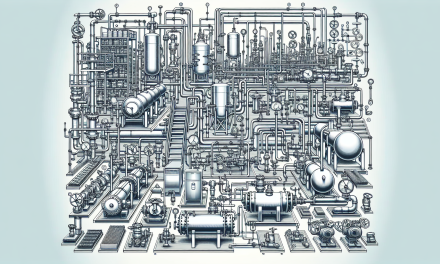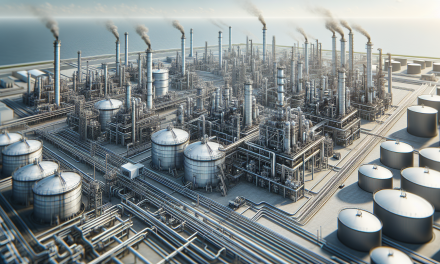Table of Contents
- Introduction
- Importance of Wastewater Treatment
- Challenges in Wastewater Treatment
- Methods for Wastewater Treatment
- Case Studies
- Future Trends in Wastewater Management
- FAQs
- Conclusion
Introduction
In recent years, the need for effective wastewater management in the oil refinery and petrochemical industries has skyrocketed. As environmental regulations become stricter, companies must prioritize sustainable practices. Consequently, knowledge about wastewater treatment is essential for professionals in these sectors.
Importance of Wastewater Treatment
Wastewater treatment serves numerous critical purposes. Firstly, it protects local ecosystems by ensuring contaminants do not seep into groundwater or nearby bodies of water. Secondly, proper treatment helps companies comply with environmental regulations, thereby avoiding hefty fines. Moreover, treating wastewater can lead to the recovery of valuable resources, such as water and energy.
Economic Benefits
Interestingly, effective wastewater management can reduce operational costs in the long run. For example, companies can reuse treated water for various processes, saving money on sourcing fresh water. Furthermore, utilizing waste as a resource can minimize treatment costs significantly.
Challenges in Wastewater Treatment
Despite the criticality of wastewater treatment, several challenges persist in the oil and petrochemical industries. Understanding these obstacles allows for more informed decision-making.
Environmental Impact
One of the significant challenges facing the industry is the environmental impact of untreated wastewater. Industries often discharge wastewater laden with harmful pollutants, which can pose severe risks to public health and ecosystems. Monitoring and managing these discharges require robust systems and procedures.
Technological Advancements
Technological advancements have transformed wastewater treatment in recent years. However, adapting to new technologies presents its own set of challenges. Companies must stay updated with the latest methods and invest in staff training to leverage these advancements effectively.
Methods for Wastewater Treatment
Numerous methods for treating wastewater exist, and selecting the appropriate method often depends on the nature of the waste and local regulations. Generally, these methods can be categorized into physical, chemical, and biological techniques.
Physical Methods
Physical methods involve processes such as sedimentation, filtration, and flotation. These techniques aim to remove solids and particulate matter from wastewater. For instance, sedimentation, which enables particles to settle, serves as a fundamental step in many treatment systems.
Chemical Methods
Chemical treatment methods utilize chemical reactions to remove contaminants from wastewater. Technologies such as coagulation and flocculation play a vital role in this category. Additionally, chemical disinfectants help eliminate bacteria and viruses, ensuring the treated water is safe for its intended use.
Biological Methods
Biological methods rely on microorganisms to break down organic matter in wastewater. These techniques can effectively reduce the concentration of pollutants and are often seen in treatment plants designed for higher organic loads. Aerobic and anaerobic digestion represent two primary biological processes used today.
Case Studies
Successful wastewater management practices can be illustrated through various case studies. Companies that implement best practices and innovative technologies often see notable improvements in their operations.
Example 1: A Major Oil Refinery
A significant oil refinery implemented advanced filtration and treatment systems. As a result, they achieved a more than 80% reduction in wastewater pollutants, leading to substantial cost savings while meeting regulatory requirements. They also capitalized on the reused water for irrigation and other non-potable applications.
Example 2: Petrochemical Plant Initiative
Another case involved a petrochemical plant that adopted a combined process of biological treatment and advanced oxidation processes. This blend not only reduced the pollutant load efficiently but also increased the overall treatment capacity. Thus, the facility ensured compliance and contributed positively to community standards.
Future Trends in Wastewater Management
As industries evolve, so too must wastewater treatment practices. Future trends indicate a shift toward more integrated and sustainable wastewater management systems.
Moreover, innovations in sensor technology and real-time monitoring will enable companies to track water quality and treatment effectiveness more accurately. Consequently, proponents of these technologies can address potential challenges before they escalate.
Emerging Technologies
Technologies such as membrane filtration and electrocoagulation show great promise in improving treatment efficacy. Utilizing these advances can enhance sustainability and operational efficiency significantly.
FAQs
What is wastewater treatment in the oil and petrochemical industries?
Wastewater treatment involves removing harmful contaminants from water produced during oil refining and petrochemical processes. Proper treatment ensures compliance with environmental regulations and protects ecosystems.
What are the challenges associated with wastewater treatment?
Challenges include environmental impacts from untreated water, the need for advanced technologies, and compliance with regulatory standards. Staying updated on these factors is essential for effective management.
How can I learn more about wastewater treatment practices?
For those interested in extensive wastewater treatment practices, consider exploring resources like the Oil Refinery & Petrochemical Wastewater Treatment Course, which offers valuable insights into best practices and solutions.
What technologies are being used in wastewater treatment?
The industry is currently seeing the implementation of technologies such as membrane processes, biological treatment, advanced oxidation, and sensor technologies for better monitoring.
What are the economic benefits of efficient wastewater treatment?
Efficient wastewater treatment can lower operational costs by enabling water reuse, reducing disposal fees, and minimizing fines for non-compliance.
Conclusion
In summary, wastewater management in the oil refinery and petrochemical sectors is a multifaceted challenge that offers both risks and opportunities. As regulations continue to tighten, prioritizing effective treatment practices becomes paramount for sustainable operations. By adopting innovations and best practices, companies can protect the environment, comply with regulations, and realize economic benefits. To gain further knowledge and skills in this area, ensure to check out specialized training resources, such as those provided by various industry experts. Learning and adapting are vital in this ever-evolving field, so stay informed and proactive.





